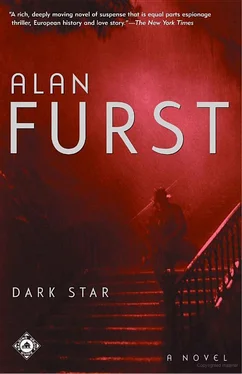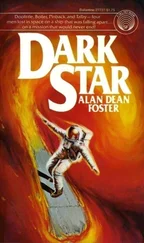Alan Furst - Dark Star
Здесь есть возможность читать онлайн «Alan Furst - Dark Star» весь текст электронной книги совершенно бесплатно (целиком полную версию без сокращений). В некоторых случаях можно слушать аудио, скачать через торрент в формате fb2 и присутствует краткое содержание. Жанр: Шпионский детектив, на английском языке. Описание произведения, (предисловие) а так же отзывы посетителей доступны на портале библиотеки ЛибКат.
- Название:Dark Star
- Автор:
- Жанр:
- Год:неизвестен
- ISBN:нет данных
- Рейтинг книги:3 / 5. Голосов: 1
-
Избранное:Добавить в избранное
- Отзывы:
-
Ваша оценка:
- 60
- 1
- 2
- 3
- 4
- 5
Dark Star: краткое содержание, описание и аннотация
Предлагаем к чтению аннотацию, описание, краткое содержание или предисловие (зависит от того, что написал сам автор книги «Dark Star»). Если вы не нашли необходимую информацию о книге — напишите в комментариях, мы постараемся отыскать её.
Dark Star — читать онлайн бесплатно полную книгу (весь текст) целиком
Ниже представлен текст книги, разбитый по страницам. Система сохранения места последней прочитанной страницы, позволяет с удобством читать онлайн бесплатно книгу «Dark Star», без необходимости каждый раз заново искать на чём Вы остановились. Поставьте закладку, и сможете в любой момент перейти на страницу, на которой закончили чтение.
Интервал:
Закладка:
As he did every day, sometimes every hour. To the address in Schillerstrasse he sent postcards. Signed B. A would have been for Andre, B was what he was now. She would understand this immediately, he knew. This B was a wealthy sort of cad, traveling about southern Europe on business, who now and then gave a thought to his old girlfriend Nadia who lived in Germany. “The sea is quite lovely,” said B from a town on the Black Sea coast of Turkey. In Bucharest he’d “finally got over a beastly cold.” In Zagreb, where he worked for two old Jewish brothers who had a market stall where they sold used pots and pans, B detected “signs of spring in the air.” I am alive, he told her in this way. I am not in Germany, not in Russia, I am free. But living a life-in Varna, Corfu, Debrecen-that she could not possibly share. “Love always,” said B, mailing his card an hour before he left a city. What love always really meant, the ten thousand words of it, he could only hope she understood. In the ruined beds of a hundred rooms spread across the lost quarters of Europe, her ghost lay with him every night.
When he worked, it was almost always in Yiddish. Even in the Sephardic communities where they spoke Ladino, somebody was sure to know it. In the outdoor markets, in the back streets of almost any city, he found Jews, and they almost always needed something done. He didn’t ask very much, and they’d nod yes with a tight mouth, probably you’ll rob me. It wasn’t exactly charity, just something in the way they were that didn’t like to say no. Maybe he was hungry. He didn’t look strong enough to load or unload wagons but he did it once or twice. Mostly he cleaned up, or ran errands, or sold things. The dented, blackened pots and pans in Zagreb. Secondhand suits in Bucharest. Used dishes, sheets, tools, books-even eyeglasses. “No?” he’d say. “Then try these. Can you see that girl over there? Perfect! That’s silver in those frames-you look ten years younger.” It was easy to pick up-he had to wonder if it hadn’t been there all the time-and it had to be done, a premium for the customer. Who wanted to buy from a stone? In these streets, money was earned and spent in the cheapest coin there was, a whole dinar, a lek or a lev, that you never saw. But life was cheap. He lived on bread and tea, potatoes and onions, cabbage and garlic. A little piece of dried-up meat was a banquet. If it had a rim of fat at the edge, a feast. His skin grew red and rough from being outdoors in the winter, his hands hard as leather. He’d beckon a customer to him confidentially, look both ways to make sure no one was listening, slip a subtle finger beneath a lapel and say, “Listen, you got to buy from me today, you’re not going to anybody else. So make a price, I don’t care, I’m a desperate man.” The owner of a stall that sold buttons and thread said to him in Constanta, “David”-for so he called himself that week-“you’re the best luftmensch I ever had. Maybe you’ll stay awhile.”
He became, that spring, the other kind of luftmensch as well, the man as inconspicuous as air, the operative. Privately, at first, in the way he began to remember his past. It came back like an old love affair, the ashes of his former life a little warmer than he’d thought.
He found himself in Izmir, the old Greek city of Smyrna, now Turkish. Just by the old bazaar, on Kutuphane street, was a restaurant owned by a swarthy little Sephardic lady with shining black eyes. For her he scrubbed pots. It turned his hands and forearms crimson, and he earned almost nothing, but she was a provident feeder-he lived on lamb and pine nuts and groats, dried figs and apricots-and she had an unused room in the cellar with a dusty straw mattress on an old door that he could sleep on. There was even a table, the edges marked by forgotten cigarettes, and a kerosene lamp. Through a half window at sidewalk level he could see Kadifekele, the Velvet Fortress, perched on top of its hill. He had a strong, intuitive feeling about the room: a writer had worked there. The old lady’s son was something or other in the administrative section of the Izmir police, and for the first time in his travels Jean Bonotte had an actual work permit, though not under that name. “Write down,” she’d said. And he’d laboriously scrawled some concoction on a scrap of paper. A week later, a permit. “My son!” she explained of the miracle. Fortune smiled. Izmir wasn’t a bad place: a sharp wind blew across the docks off the Aegean, the harbor was full of tramp freighters. The people were reserved, slightly inward, perhaps because, not so many years earlier, the blood had literally run in the streets here, Turks slaughtering Greeks, and the town couldn’t quite put it in the past.
From his meager wages Szara bought a notebook and pencils and, once the huge iron pots were dried and put away for the evening, began to write. This was night writing, writing for himself, with no audience in mind. It was March, a good writer’s month, Szara felt, because writers like abundant weather-thunder and lightning, wind and rain, surging spring skies-not particularly caring if it’s good or bad just so there’s a lot going on. He wrote about his life, his recent life. It was hard, he was surprised at the emotional aches and pains it cost him, but evidently he wanted to do it because he didn’t stop. On the near horizon was what Von Polanyi had said about the executions of the 1936 purge and the secret courtship of Hitler and Stalin. But it was life he wrote about, not so much politics. Izmir, he sensed, was not a place where you would want to write about politics. It was almost too old for that, had seen too much, lived somewhere beyond those kinds of explanations-here and there the marble corner of a tumbled-down ruin had been worn to a curve by the incessant brush of clothing as people walked by for centuries. In such a place, the right thing to do was archaeology: archaeology didn’t have to be about the ancient world, he discovered; you could scrape the dirt away and sift the sand of more recent times. The point was to preserve, not to lose what had happened.
Working down through his life, beneath the common anarchy of existence, the misadventures, dreams, and passions, he found pattern. Rather, two patterns. If every life is a novel, his had two plots. He discovered he had, often at the same moment, both served and resisted the Hitler/Stalin affaire, had worked for two masters, both in the Soviet special services. Bloch and Abramov.
What General Bloch had done was both daring and ingenious and, Szara came to believe, driven by desperation. He knew what was going on, he fought against it. And in this war Andre Szara had been one of his soldiers. To Szara, the depth of the operation and his part in it became clear only when he applied the doctrine of chronology-the exercise in a cellar in Izmir no different than the one he’d undertaken in a hotel room in Prague, when he’d worked through DUBOK‘s, Stalin’s, history of betrayal.
Bloch had become aware of Stalin’s move toward Hitler sometime before 1937 and had determined to prevent the alliance by naming Stalin as an Okhrana agent. He had somehow broken into Abramov’s communication system and ordered Szara aboard the steamship taking Grigory Khelidze from Piraeus to Ostend. Khelidze was on his way to Czechoslovakia to collect the Okhrana file hidden sometime earlier in a left-luggage room in a Prague railway station. Szara had induced Khelidze to reveal his whereabouts in Ostend, then Bloch had ordered the courier’s assassination. Then he’d used Szara as a substitute courier, used him to uncover Stalin’s crimes in the Bolshevik underground, used him to publish the history of that treason in an American magazine. It had almost worked. The Georgian khvost, however, had somehow learned of the operation and prevented publication from taking place.
Читать дальшеИнтервал:
Закладка:
Похожие книги на «Dark Star»
Представляем Вашему вниманию похожие книги на «Dark Star» списком для выбора. Мы отобрали схожую по названию и смыслу литературу в надежде предоставить читателям больше вариантов отыскать новые, интересные, ещё непрочитанные произведения.
Обсуждение, отзывы о книге «Dark Star» и просто собственные мнения читателей. Оставьте ваши комментарии, напишите, что Вы думаете о произведении, его смысле или главных героях. Укажите что конкретно понравилось, а что нет, и почему Вы так считаете.












